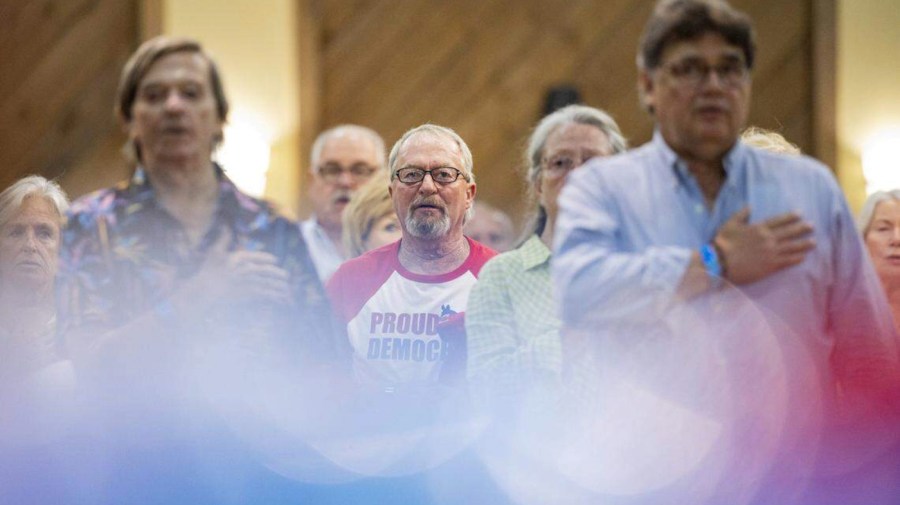Trump is sinking, but Democrats aren’t rising — here’s why

Like all good flimfam artists, President Trump is a master of misdirection.
As Americans grow increasingly skeptical of his inflationary tariffs, deficit-swelling tax cuts and senseless push to gut federal agencies and research, he floods the zone with a firehose of falsehoods to shift media and public attention elsewhere.
Take his grandstanding plan to dispatch U.S. troops to Chicago and other cities, as he’s already done to Los Angeles and Washington, D.C. It’s a classic “wag the dog” ploy with a Trumpian twist: Instead of fabricating a foreign military crisis to divert voters from their domestic woes, he’s invading America’s blue metros.
Crime and public disorder, including sprawling homeless encampments, are serious problems. But a rational president would partner with local leaders to alleviate them instead of putting our cities under military occupation.
Trump’s grotesquely exaggerated claims of urban anarchy discredit America in the world’s eyes so he can score political points at home. Hard-core Republicans eat it up, but the rest of the country seems unswayed by the president’s gaslighting.
The president’s job approval rating has slipped to 38 percent in the Pew Center’s latest poll. Voters also give Trump’s main policy initiatives a thumbs down.
They strongly disapprove (61-38) of his tariffs, the retro centerpiece of Trumponomics. A solid majority of 55 percent say they lack confidence in Trump’s ability to make good decisions on economic policy.
Voters evidently aren’t big fans of DOGE either; nearly two-to-one, they say Trump is making the federal government work worse rather than better. And they disapprove of Trump’s budget-busting mega-bill by a 10-point margin (42-32).
Trump is losing ground among independents, soft-core Republicans, young voters and people who didn’t vote in 2024. This might sound like celestial music to Democrats, but for one jarring note: They are even less popular than Trump and his party.
A sobering Wall Street Journal poll last month found that 63 percent of voters hold an unfavorable view of the Democratic Party — the highest level in the 35 years they have been asking the question.
Even as they give Trump low grades on tariffs, inflation and foreign policy, voters say they trust Republicans more than Democrats to handle every major issue except health care.
Here’s another way to fathom the hole Democrats have dug themselves into. A New York Times study found that, between the 2020 and 2024 elections, Democrats lost ground to Republicans in every one of the 30 states that track voter registration by party. In total, there was a net swing of 4.5 million to the Republicans.
Rather than reckon with such grim realities, Democrats again are seeking refuge in the politics of evasion. It takes two forms: Calls for intensifying “resistance” to Trump and the beguiling hope that success in next year’s midterm election will spare them a bruising factional fight over the party’s core principles and purposes.
Of course, Democrats should call out Trump’s destructive policies, blatant abuses of power and his diabolical knack for setting Americans at each other’s throats. But if that’s all they do, they’ll just be advertising their political impotence.
There’s a reasonable chance that, given the usual anti-incumbent dynamics of a midterm election, Democrats will recapture the House next year and thus be able to offer more than rhetorical resistance to Trump.
That’s why the president has instructed pliant Republicans in Texas and Missouri not to wait until the next census to draw new political maps. He wants them to gerrymander more Republican House seats in time for next year’s election. It’s not as bad as Jan. 6, but it reminds us that Trump is America’s election-rigger-in-chief.
But even if Democrats manage to eke out a midterm win, taking control of one chamber on Capitol Hill won’t fix their structural problem: the steady hemorrhaging over the past quarter-century of non-college voters, lately compounded by severe erosions among Black and Hispanic as well as young voters.
Without winning back a sizable chunk of working-class voters, Democrats won’t be able to compete nationally or build the large and lasting majorities they need to blunt today’s reactionary populism and govern effectively.
There’s only one way to do that: Show the country they’ve changed. That starts by publicly acknowledging mistakes, like not taking public anger over illegal immigration and crime seriously. It also means repudiating the illiberal excesses of identity politics and embracing cultural moderation.
Democrats also should jettison factory nostalgia and leave protectionism and industrial policy to Trump and right-wing populists. They need a modern, forward-looking strategy for repairing the broken engine of upward mobility for non-college workers.
A new Democratic blueprint for abundant growth and opportunity would be both pro-worker and pro-business and play to America’s strengths in innovation and entrepreneurship.
It would give priority to driving down housing, health care and energy costs, promoting competition in consolidated markets, creating more “earn and learn” opportunities for workers without college degrees to hone their job skills, radically improving public schools, restoring fiscal responsibility in Washington and making government nimbler and more user-friendly.
Let’s face it: All this will require a rupture with a party establishment that’s grown too comfortable with a status quo that serves entrenched interest groups and affluent elites but leaves working Americans on the outside looking in.
Democrats should be heartened that Americans are beginning to see through Trump’s reality-distorting attempts to play them for suckers. But it’s not enough for Trump to sink — Democrats must rise to the occasion by remaking themselves the party of economic progress and political change America needs.
Will Marshall is founder and president of the Progressive Policy Institute.